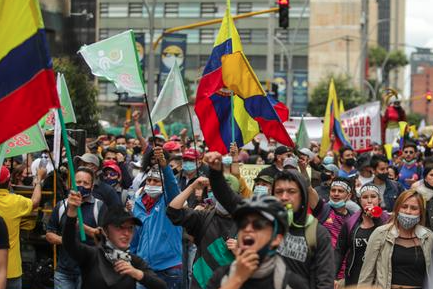
Jun 4, 2021 | News
Colombian authorities should immediately stop law enforcement officials from using excessive force to respond to protests and withdraw the military from law enforcement functions, said the ICJ today.
Over the course of ongoing protests, largely against economic and social conditions, multiple human rights and other civil society organizations have documented widespread human rights violations, including instances of torture and ill-treatment, sexual violence, extrajudicial killings, and enforced disappearances.
“The reports of violence and excessive and often unnecessary use of force by law enforcement officials are part of a wider failure of the authorities to adopt effective measures to protect and guarantee the right to life and the right to peaceful protest” said Carolina Villadiego, ICJ legal adviser for Latin America.
According to Indepaz, a local Non-Governmental Organization, as of 30 May 2021, at least 71 people had been killed, likely unlawfully, in the context of the protests. The situation is particularly dire in Cali where in just one day, 28 May 2021, 13 people were reportedly killed. In addition, it has been documented that firearms and lethal force have been deployed against protestors, including indigenous persons, by armed individuals in Cali. In at least one incident, multiple video recordings show police officials were present during the shootings and took no action to stop the shootings or apprehend the armed individuals.
Police and other law enforcement officials have the obligation to defend the rights of people, including their right to protest, and to protect them from violence by others. Colombian law enforcement officials have not only violated their obligation to avoid use of unnecessary or excessive use of force against people, but in Cali, they seem to have failed to prevent criminal violence by armed individuals as well.
“There must be a prompt, thorough and impartial investigation into these violations with a view to holding accountable those responsible”, said Carolina Villadiego.
The ICJ is also deeply concerned with militarization of the response to the protests. On 28 May 2021, President Duque issued Decree 575 of 2021 that authorizes the intervention of military forces in at least eight departments out of thirty two in the country, to assist in the lifting of any kind of roadblocks and to prevent the installation of new blockades by protesters. The Decree fails to consider any limitation of the use of force by military forces in line with international law standards such as the UN Basic Principles on the Use of Force by Law Enforcement.
Additionally, the sweeping and overbroad scope of the Decree to involve the military forces in what are inherently law enforcement functions does not consider that they are not trained or designed to protect civilians during protests or scenarios of public order disruption.
The ICJ urges the Colombian Government to fully respect the UN Basic Principles and other international standards on the use of force and the intervention of military forces to control protests and demonstrations. In this regard, the Government must fully comply with the September 2020 ruling on measures to guarantee peaceful protests issued by the Colombian Supreme Court.
In the ruling, the Supreme Court identified serious violations regarding the intervention of law enforcement officials, especially police officials, in protests and demonstrations. The Court identified systematic violence against demonstrators, the existence of stereotypes and prejudice against those who criticize the government’s policies, and a lack of mechanisms to hold the officials accountable.
Consequently, the Court ordered several measures to address this situation and guarantee the right to peaceful protest, including adopting and implementing a protocol to regulate the use of force during protests and manifestations, in accordance with international human rights standards.
The ICJ also calls on the Colombian Government to guarantee the right to peaceful protest. As the UN Human Right Committee has clearly affirmed, the right to peaceful protest may entail the disruption of vehicular or pedestrian movement, which “may be dispersed, as a rule, only if the disruption is “serious and sustained””.
While the vast majority of protestors have acted peacefully, there have been some instances where they have not. The ICJ calls on all persons to avoid violence during the protests and condemns the crimes committed against police officials, including the killing of at least two police officers, the serious injuries suffered by one police officer after being hit by a Molotov cocktail, and the sexual violence suffered by a police woman.
The ICJ deplores the particular use of some roadblocks that have affected the delivery of essential medical services, as well as the fires at the courthouse in Tuluá and other public buildings. Any individual engaging in criminal behaviour must be impartially investigated and, if found guilty in a fair trial, brought to account.
Finally, the ICJ also urges the National Government to fully cooperate with the mission of the Inter-American Commission on Human Rights (IACHR) to Colombia that will take place from 8 June to 10 June 2021. The Government should respect and ensure the IACHR’s independence and autonomy during the visit.
Contacts:
Carolina Villadiego Burbano, Latin American Legal and Policy Adviser, email: carolina.villadiego(a)icj.org
Rocío Quintero M, Latin American Legal Adviser, email: rocio.quintero(a)icj.org
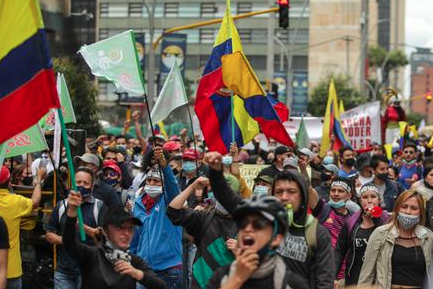
May 7, 2021 | News
The Colombian Commission of Jurists (CCJ) and the ICJ have called upon national and local authorities to respect the right of peaceful assembly and cease all use of unlawful force against protestors immediately.
Beginning 28 April, thousands of people have taken to the streets in towns and cities throughout Colombia to protest and the social and economic policies of the current national government. As of this writing the protests continue.
The CCJ and the ICJ have expressed their concern about widespread and serious human rights violations committed during the protests.
There are multiples reports from civil society organizations that document incidents where police officials have opened fire with live ammunition against protestors.
Although full and precise figures are unavailable, as of 6 May 2021, according to the Ombudspersons’ Office at least 26 people had lost their lives. In at least 11 cases, police officials were allegedly responsible for the killings.
The NGO Temblores has documented 37 killings and the NGO Indepaz has information of more than 1.200 people injured during the protests. In addition, a number of cases of sexual violence have been reported.
The organizations are especially concerned that there are substantial number of people whose whereabouts are unknown. Complete figures on possible disappeared persons are not available. Even more worrisome, there are substantial differences among the figures provided by different sources.
In this regard, for instance, the Ombudspersons’ Office said that it has received information about the possible disappearance of 145 people. The Ombudspersons’ Office has established the whereabout of 55 people.
For its part, the civil society platform Mesa de Trabajo sobre Desaparición Forzada en Colombia has informed that it has information of 471 potential cases of enforced disappearances. According to the platform, the whereabout of 92 people have been determined.
The violent acts committed in Valle del Cauca are particularly serious. In this region, it has been reported that at least 17 people have died, and an undetermined number of people are seriously wounded.
Similarly, in Cali, some members of human rights organizations and the Office of the United Nations High Commissioner for Human Rights in Colombia alleged that they had been subject to verbal attacks and physical assault when there were verifying the situation of detained people.
The CCJ and the ICJ urge Colombian authorities to acknowledge act to address the allegations of human violations committed during the protests. They must conduct, independent, impartial, prompt, thorough, effective, and transparent investigations in accordance with Colombian law and its obligations under the International Covenant on Civil and Political Rights.
Furthermore, the investigation must take place within the ordinary criminal jurisdiction and under no circumstances should there be resort to military jurisdiction. Under international law and standards, cases that may constitute arbitrary deprivation of life or enforced disappearances cannot be considered to be connected with military duties.
Additionally, there is information that some police officials have been wounded, and at least one was allegedly unlawfully killed. The CCJ and the ICJ condemn these and other violent acts and urge judicial authorities to investigate and sanctions those responsible.
On the other hand, the CCJ and the ICJ recall that the use of force by police officials should must only be deployed in accordance with international standards. In particular, any such action must comply with the UN Basic Principles on the Use of Force and Firearms by Law Enforcement Officials.
These Principles establish that the use of force should be exceptional, necessary and proportional. Especially, authorities should faithfully comply with principle 9 that sets out that lethal force should be not used “except in self-defence or defence of others against the imminent threat of death or serious injury”.
Finally, the CCJ and the ICJ express their great concern about the national government’s decision to involve the military forces for the contention of the violence under the legal figure of “military assistance” (asistencia militar). The decision does not respect the international human rights law standards on the use of force and the right of peaceful assembly.
It should be remembered that military forces are not trained or designed to protect and control civilians during protests or scenarios of disruption of public order.
Therefore, the participation of military forces should be exceptional in situations of necessity, for example to confront immediate extreme violence and temporally limited, as affirmed by international bodies such as the UN Committee on Human rights and the Inter-American Court of Human Rights.
Contacts:
Ana María Rodríguez, Deputy Director of the Colombian Commission of Jurists, anarodriguez(a)coljuristas.org
Rocío Quintero M, Latin American Legal and Policy Adviser, International Commission of Jurists, rocio.quintero(a)icj.org
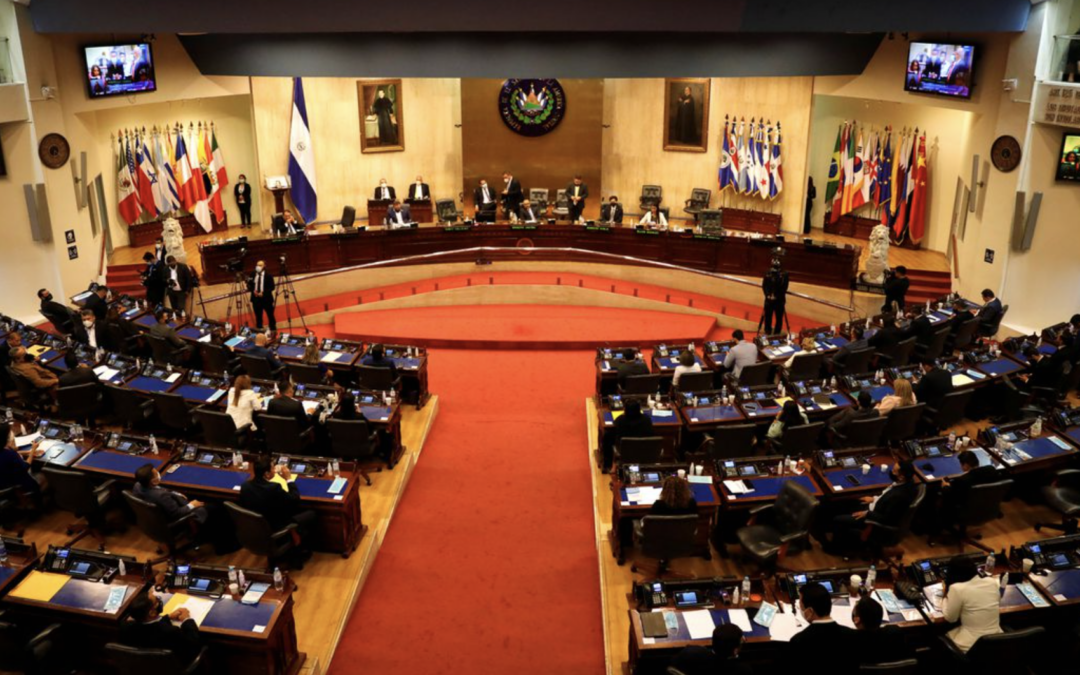
May 5, 2021 | News
The ICJ today condemned the dismissal of all five of the justices serving in El Salvador’s Supreme Court Constitutional Chamber by the country’s newly elected Legislative Assembly, backed by El Salvador’s President Nayib Bukele.
The dismissal on 2 May was justified on vague allegations of arbitrariness and dereliction of functions particularly relating to judicial decisions taken striking down government action related to the COVID-19 Pandemic. The Legislative Assembly also dismissed El Salvador’s Attorney General.
The ICJ stressed that the dismissal violated core tenets of the independence of the judiciary, by which judges are subject to dismissal only “for reasons of incapacity or behaviour that renders them unfit to discharge their duties.” (United Nations Basic Principles on the Independence of the Judiciary). Any decision must also be subject to a fair hearing of individual judges, with full due process guarantees.
The dismissal process was carried out without any individualized hearings, and without a clear expression of a legitimate basis for the dismissal.
The ICJ is concerned that this summary dismissal will undermine the independence of the judiciary, including by intimidating other judicial authorities in the country.
The dismissal of judges and the Attorney General was followed by the immediate appointment and swearing in office of other judges in replacement. This decision violates the procedural rules of selection and appointment, which are essential to safeguard the independence and impartiality of the judges serving in the Constitutional Chamber.
The decision to dismiss the judges was taken by a qualified majority of legislators, shortly after the new legislative assembly started its functions, in a swift procedure that lasted just a few hours.
The ICJ urges the government of El Salvador to restore respect to fundamental rule of law principles to prevent the arbitrary use of power and impunity.
The country is particularly vulnerable to impunity for human rights violations, where an independent judiciary is not in place to assess the lawfulness of government actions.
The ICJ calls on the responsible authorities of the Inter-American Commission for human rights and the United Nations human rights system to address the situation as a matter of priority.
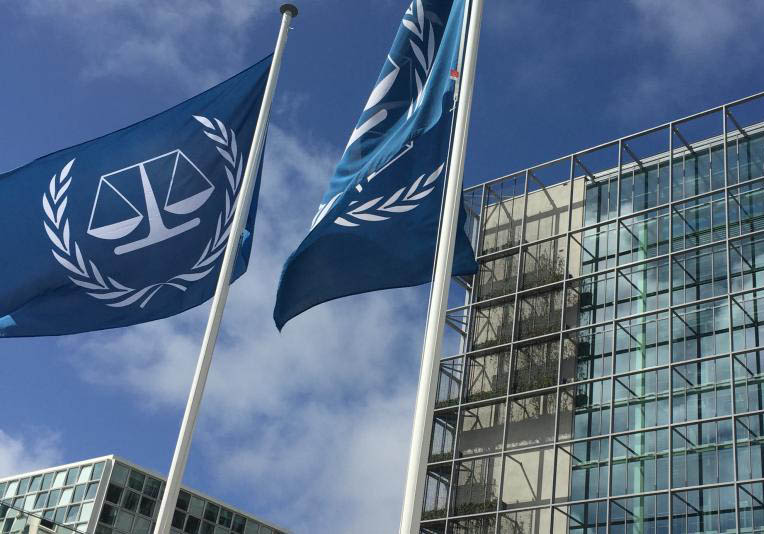
Feb 18, 2021 | News
The ICJ and more than 70 other non-governmental organisations, faith-based groups, and academic institutions urge the Biden Administration to engage constructively with the International Criminal Court (ICC).
The statement reads:
The undersigned organizations urge the Biden Administration to engage constructively with the International Criminal Court (ICC). The U.S. government’s support for the ICC could help secure justice for victims in situations from Myanmar to Darfur, just as it helped facilitate the February 4 historic conviction of a former leader of an armed rebel group for war crimes and crimes against humanity in northern Uganda.
There is an immediate need to act to reset U.S. policy regarding the ICC. Most urgently, we are alarmed by recent calls for the U.S. government to maintain or even expand the sanctions put into place by the Trump administration in June 2020 currently targeting the court’s work.
These actions were an unprecedented attack on the court’s mandate to deliver justice and the rule of law globally, an abuse of the U.S. government’s financial powers, and a betrayal of the U.S. legacy in establishing institutions of international justice. They were also an attack on those who engage with the court, including human rights defenders and victims. These extraordinary measures have put the U.S. at odds with many of its closest allies. They also have been challenged on constitutional grounds domestically.
Keeping in place the executive order authorizing sanctions would be inconsistent with the new administration’s laudable commitments to respecting the rule of law and pursuing multilateral cooperation in support of U.S. interests. It would also transform a shameful but temporary action into a standing license for other governments to attack multilateral institutions when they disagree with those bodies’ actions.
We call upon the U.S. government to rescind Executive Order 13928 and all sanctions measures against ICC officials at the earliest possible opportunity. We appeal for constructive engagement with the ICC and we urge the Biden administration and members of Congress to support that approach.
Download
USA-Biden-Joint-Statement-2021-ENG (Full statement with list of organizations)
Contact
Kingsley Abbott, ICJ Director, Global Redress and Accountability; e: kingsley.abbott(a)icj.org
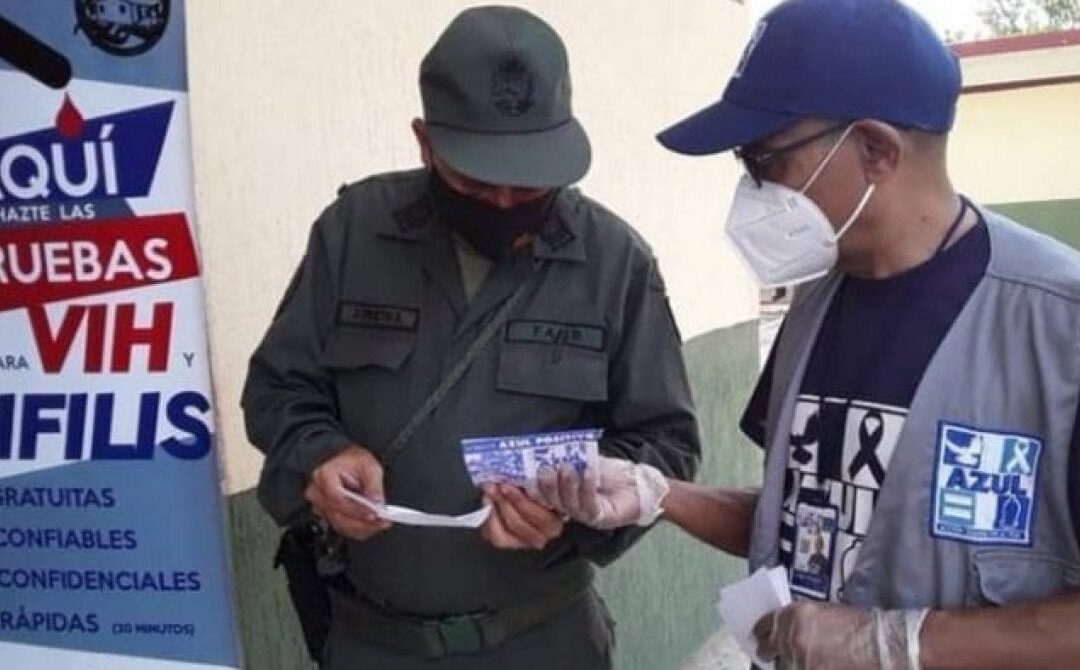
Feb 6, 2021 | News
The recent, ongoing and unwarranted detention of five members of the Venezuelan NGO ‘Azul Positivo’ is one more event in a series of threats, harassment, attacks, restrictions, reprisals and criminal proceedings against Venezuelan civil society organizations and human rights defenders, which has been intensifying since November 2020.
In recent months and weeks, state agents have forcibly entered the offices of civil society organizations; public threats have been made against defenders who have been engaging with human rights mechanisms, NGO bank accounts have been frozen and arrest warrants issued for aid workers.
Venezuelan civil society operate in a context of serious legal and administrative obstacles with domestic laws used to target human rights defenders, such as the ‘Law Against Hate’, or having the effect of limiting the operations of NGOs and restricting their access to funding, essentially blocking the work of many organizations vital for Venezuelans in need.
In a public statement, a number of UN independent human rights experts and regional experts have described threats and measures taken against Venezuelan civil society since November 2020 as amounting to ‘systematic persecution and stigmatization.’
It is essential that humanitarian and human rights organizations responding to the grave humanitarian and human rights crises in the country, pushing for accountability for violations and abuses and the return of guarantees provided by democratic institutions and processes are able to do their work without fear or hindrance.
Human rights defenders are critical, constructive and essential to democracies and the functioning of the rule of law. Attempts to silence and cow them are counterproductive and shameful.
We urge the Venezuelan authorities to ensure that harassment and threats against Venezuelan defenders stop and for all international legal guarantees to be respected. We call on all states and UN bodies and agencies to actively support civil society organizations, defenders and activists and to speak up loudly and consistently for the right to defend human rights in Venezuela and globally.
We are inspired by the daily commitment and courage of Venezuelan human rights defenders and humanitarian workers and stand in solidary with our Venezuelan partners and friends.
Amnesty International
Center for Justice and International Law (CEJIL)
CIVICUS
Civil Rights Defenders
Conectas Diretos Humanos
Freedom House
Global Centre for the Responsibility to Protect
Human Rights Watch
International Commission of Jurists
International Service for Human Rights
People in Need
Washington Office on Latin America (WOLA)









